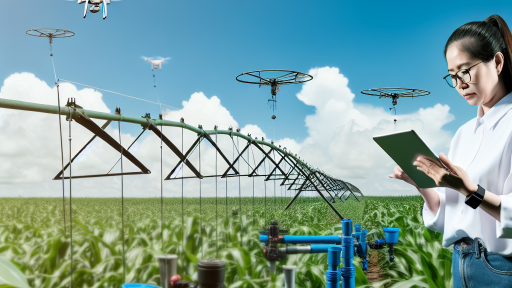Understanding Local Water Rights and Allocations
Basics of Water Rights
Water rights determine who can use water from a specific source.
Each region has distinct rules governing these rights.
Farmers must familiarize themselves with local water laws.
Legal entitlements can impact agricultural operations significantly.
Types of Water Rights
There are generally two types of water rights.
- Riparian rights allow landowners to use water adjacent to their land.
- Prior appropriation rights permit the first user to claim a water source.
Understanding the differences is crucial for effective water management.
Water Allocation During Droughts
Drought conditions require careful water allocation measures.
State authorities often enforce restrictions during such periods.
Farmers should stay informed about current drought regulations.
Moreover, understanding allocation priorities can benefit resource planning.
Permits and Regulations
Obtaining a water use permit is essential for many farmers.
Permits outline the quantity and purpose of water use.
Failing to acquire necessary permits can lead to legal issues.
Moreover, periodic permit reviews keep water usage compliant.
Compliance and Best Practices
Compliance with water regulations fosters sustainability.
Transform Your Agribusiness
Unlock your farm's potential with expert advice tailored to your needs. Get actionable steps that drive real results.
Get StartedFarmers should adopt best practices for efficient water usage.
- Implementing drip irrigation can minimize water waste.
- Regularly maintaining systems helps ensure maximum efficiency.
Furthermore, participating in local water management programs can enhance collaboration.
The Importance of Water Conservation in Agriculture
Water as a Vital Resource
Water serves as the lifeblood of agriculture.
It fuels plant growth and supports livestock health.
Without adequate water, crop yields diminish significantly.
Farmers depend on a consistent water supply for sustainable harvests.
The Role of Water in Crop Production
Effective water management enhances crop productivity.
It reduces stress on plants, leading to healthier growth.
Additionally, optimized irrigation techniques maximize efficiency.
Farmers can yield more crops with less water when managed effectively.
Consequences of Poor Water Management
Overusing water can lead to resource depletion.
This practice results in reduced water quality over time.
Moreover, it causes soil degradation, affecting future planting.
Farmers face higher production costs in regions with water scarcity.
Implementing Conservation Practices
Farmers can adopt various techniques to conserve water.
For instance, rainwater harvesting collects nature’s resources efficiently.
Using drip irrigation minimizes water waste during application.
Cover crops also help retain moisture in the soil.
Long-term Benefits of Water Conservation
Conserving water promotes environmental sustainability.
This approach ensures resources are available for future generations.
Farmers benefit economically from reduced water costs.
Ultimately, proper management leads to more resilient farming systems.
Utilizing Rainwater Harvesting Techniques
Importance of Rainwater Harvesting
Rainwater harvesting is a crucial practice for modern agriculture.
It helps reduce dependency on traditional water sources.
Showcase Your Farming Business
Publish your professional farming services profile on our blog for a one-time fee of $200 and reach a dedicated audience of farmers and agribusiness owners.
Publish Your ProfileFarmers can efficiently manage water supply through rainwater collection.
This method can significantly lower water costs for farming operations.
Basic Components of Rainwater Harvesting Systems
A rainwater harvesting system typically includes several key components.
First, a catchment area collects rainwater during precipitation.
Second, gutters and downspouts help direct the water to storage tanks.
Third, filtration systems ensure the collected water remains clean.
Lastly, storage tanks hold the water for future use.
Designing an Effective System
Effectively designing a rainwater harvesting system requires careful planning.
Identify the catchment area size for maximum water capture.
Consider local rainfall patterns to optimize your system’s efficiency.
Choose appropriate storage solutions based on your water needs.
Additionally, incorporate filtration methods to maintain water quality.
Implementing Best Practices
Several best practices can enhance the effectiveness of your rainwater harvesting system.
- Regularly inspect and maintain gutters and collection systems.
- Use first-flush diverters to improve water quality.
- Ensure proper sizing of storage tanks to meet usage demands.
- Monitor rainfall trends to adjust usage accordingly.
Legal Considerations and Policies
Farmers must understand local regulations regarding rainwater harvesting.
Some regions have specific laws that govern system installation and usage.
Familiarize yourself with these policies to remain compliant.
Engaging with local agricultural extension services can provide valuable insights.
Staying informed helps ensure your practices align with regulations.
Benefits of Rainwater Harvesting
Adopting rainwater harvesting offers numerous benefits for farmers.
It promotes sustainable water use and helps maintain soil health.
This practice contributes to ecosystem preservation and resilience.
Moreover, it reduces stormwater runoff, protecting nearby water bodies.
Ultimately, rainwater harvesting enhances farm productivity and sustainability.
Gain More Insights: Securing Permits for Agricultural Land Use
Regulations on Water Quality Standards for Agriculture
Importance of Water Quality in Agriculture
Water quality significantly impacts crop health and productivity.
Clean water supports proper plant growth and nutrient absorption.
Furthermore, it reduces the risk of disease in crops.
Key Regulations Governing Water Quality
Several regulatory frameworks oversee water quality standards.
The Clean Water Act sets essential guidelines in the U.S.
This act regulates pollutants released into navigable waters.
State governments enforce additional water quality regulations.
Understanding Water Testing Requirements
Farmers must frequently test their water sources.
Regular testing ensures water meets safety and quality standards.
Testing parameters often include pH levels and contaminants.
Farmers can utilize local agricultural extension services for guidance.
Best Practices for Water Management
Implementing best practices can enhance water quality.
Utilizing buffer zones near water bodies reduces runoff.
Regular maintenance of irrigation systems prevents leaks.
Adopting sustainable practices can help maintain water quality.
Impact of Non-Compliance
Failing to adhere to water quality regulations incurs penalties.
Showcase Your Farming Business
Publish your professional farming services profile on our blog for a one-time fee of $200 and reach a dedicated audience of farmers and agribusiness owners.
Publish Your ProfileNon-compliance can lead to fines and loss of operating permits.
Moreover, it can damage a farm’s reputation in the market.
Compliance ensures long-term sustainability and profitability.
Uncover the Details: Navigating Water Policies in Agriculture
Impact of Climate Change on Water Availability
Climate change significantly affects water resources worldwide.
Farmers experience increased variability in rainfall patterns.
As a result, many regions face prolonged droughts.
This situation leads to a decline in water availability for agriculture.
Moreover, excessive rainfall can cause flooding.
Flooding disrupts planting schedules and damages crops.
These extremes necessitate a rethinking of water management strategies.
Changes in Precipitation Patterns
Altered precipitation patterns directly impact farming practices.
Farmers must adapt to less predictable weather events.
This unpredictability complicates irrigation planning.
Moreover, reduced rainfall decreases the availability of surface water.
Groundwater sources become crucial during dry spells.
Groundwater Depletion
Groundwater levels decline as farmers increase pumping rates.
This depletion leads to long-term unsustainability.
Farmers may face stricter regulations on groundwater usage.
Consequently, finding balance becomes increasingly necessary.
Increased Competition for Water Resources
Water scarcity intensifies competition among various sectors.
Urban areas often prioritize water for household use.
Industry demands further complicate resource allocation.
Farmers must navigate these competing interests effectively.
Innovative Water Management Solutions
Farmers can adopt technologies for better water conservation.
Rainwater harvesting systems prove beneficial in many regions.
Furthermore, precision irrigation methods minimize waste.
Implementing these solutions will enhance water efficiency.
Policy and Regulation Implications
Climate change necessitates updated water usage policies.
Farmers should stay informed about new regulations.
Complying with these laws ensures sustainable water use.
Additionally, collaboration with local authorities is essential.
This approach can lead to more effective resource management.
Uncover the Details: Navigating Organic Certification Audits

Best Practices for Irrigation Management
Understanding Soil Moisture Needs
Regularly monitor soil moisture levels for effective irrigation.
Use soil moisture sensors to provide real-time data.
Adjust irrigation schedules based on current moisture conditions.
Choosing the Right Irrigation Method
Evaluate available irrigation methods suitable for your crops.
Select methods like drip, sprinkler, or surface irrigation wisely.
Consider local climatic conditions when making your choice.
Showcase Your Farming Business
Publish your professional farming services profile on our blog for a one-time fee of $200 and reach a dedicated audience of farmers and agribusiness owners.
Publish Your ProfileImplementing Efficient Water Use Strategies
Adopt techniques to reduce water waste during irrigation.
Employ mulching to minimize evaporation from soil surfaces.
Utilize rainwater harvesting systems to supplement water supply.
Timing Your Irrigation Properly
Identify optimal times for irrigation to reduce evaporation loss.
Irrigate during cooler parts of the day, such as early morning.
Monitor weather forecasts to avoid unnecessary watering.
Regularly Maintaining Irrigation Systems
Schedule routine maintenance for all irrigation equipment.
Inspect hoses, valves, and emitters for blockages or leaks.
Keep system components clean to ensure optimal performance.
Educating and Training Farm Staff
Train staff on best practices for efficient irrigation management.
Encourage participation in workshops and training programs.
Promote a culture of sustainability on the farm.
Documenting Water Use Practices
Maintain accurate records of water usage and crop performance.
Analyze data to make informed decisions for future seasons.
Share insights with other farmers to promote community learning.
Gain More Insights: Future Trends In Organic Certification Rules
Government Programs and Incentives for Water Efficiency
Overview of Government Initiatives
Government programs foster water efficiency in agriculture.
These initiatives support farmers in adopting sustainable practices.
Farmers can access grants and technical assistance through these programs.
Types of Financial Incentives
Financial incentives include grants, loans, and tax credits.
Grants help cover the costs of implementing new technologies.
Loans offer low-interest options for purchasing efficient equipment.
Tax credits provide financial relief for investing in water-saving methods.
Key Programs to Consider
- The Environmental Quality Incentives Program (EQIP) promotes conservation practices.
- The Conservation Reserve Program (CRP) encourages habitat restoration.
- The Agricultural Conservation Easement Program (ACEP) supports land conservation efforts.
Local and State Initiatives
Local governments also implement water efficiency programs.
They often tailor incentives to meet regional needs.
This creates additional opportunities for farmers.
The Importance of Participation
Participating in government programs can benefit farmers significantly.
These programs enhance water management efficiency.
Ultimately, this supports sustainable agriculture practices.
Evaluating the Economic Implications of Water Policies in Farming
The Importance of Water in Agriculture
Water is a critical resource for agricultural productivity.
It directly impacts crop yields and soil health.
Additionally, efficient water use enhances overall farm profitability.
Farmers must understand their local water policies to optimize usage.
Current Water Usage Regulations
Water regulations vary greatly by region and type of agriculture.
Some policies promote conservation and sustainable practices.
Others may limit access to water during dry seasons.
Farmers should stay informed about any changes in legislation.
Economic Impact of Water Policies
Water policies significantly influence agricultural production costs.
High water costs can reduce profit margins for farmers.
Conversely, subsidies for water-efficient technologies can boost profitability.
Showcase Your Farming Business
Publish your professional farming services profile on our blog for a one-time fee of $200 and reach a dedicated audience of farmers and agribusiness owners.
Publish Your ProfileTherefore, understanding these policies is essential for financial planning.
Strategies for Adapting to Water Policies
Farmers can implement various strategies to comply with water policies.
- Investing in irrigation technology can enhance efficiency.
- Participating in water conservation programs can lower costs.
- Engaging in local water management initiatives fosters community support.
Networking with other farmers can also provide valuable insights.
Long-Term Considerations
Farmers must consider the long-term effects of water policies on farming.
Future shifts in climate patterns may exacerbate water scarcity.
Creating a sustainable water management plan is crucial for resilience.
Ultimately, adapting to water policies will lead to more sustainable farming practices.




